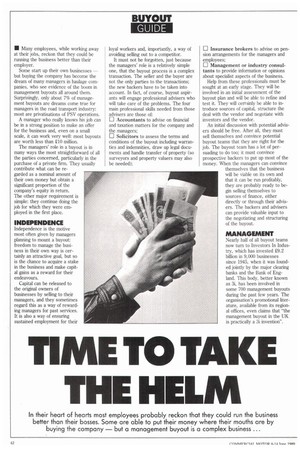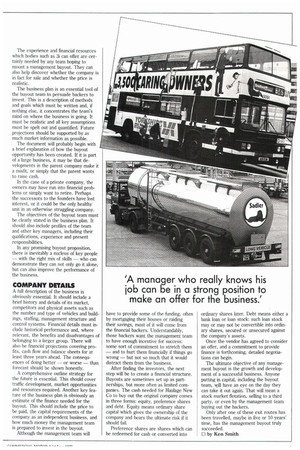TIME TO TAK
Page 44

Page 45

If you've noticed an error in this article please click here to report it so we can fix it.
THE HELM
In their heart of hearts most employees probably reckon that they could run the business better than their bosses. Some are able to put their money where their mouths are by buying the company — but a management buyout is a complex business ...
IN Many employees, while working away at their jobs, reckon that they could he running the business better than their employer.
Some start up their own businesses but buying the company has become the dream of many managers in haulage companies, who see evidence of the boom in management buyouts all around them. Surprisingly, only about 7% of management buyouts are dreams come true for managers in the road transport industry: most are privatisations of PSV operations.
A manager who really knows his job can be in a strong position to make an offer for the business and, even on a small scale, it can work very well: most buyouts are worth less than .U0 million.
The managers' role in a buyout is in many ways the most straightforward of all the parties concerned, particularly in the purchase of a private firm. They usually contribute what can be regarded as a nominal amount of their own money but obtain a significant proportion of the company's equity in return. The other major requirement is simple: they continue doing the job for which they were employed in the first place.
INDEPENDENCE
Independence is the motive most often given by managers planning to mount a buyout: freedom to manage the business in their own way is certainly an attractive goal, but so is the chance to acquire a stake in the business and make capital gains as a reward for their endeavours.
Capital can be released to the original owners of businesses by selling to their managers, and they sometimes regard this as a way of rewarding managers for past services. It is also a way of ensuring sustained employment for their loyal workers and, importantly, a way of avoiding selling out to a competitor.
It must not be forgotten, just because the managers' role is a relatively simple one, that the buyout process is a complex transaction. The seller and the buyer are not the only parties to the transactions; the new backers have to be taken into account. In fact, of course, buyout aspirants will engage professional advisers who will take care of the problems. The four main professional skills needed from those advisers are those of:
0 Accountants to advise on financial and taxation matters for the company and the managers;
Solicitors to assess the terms and conditions of the buyout including warranties and indemnities, draw up legal documents and handle transfer of property (so surveyors and property valuers may also be needed); Insurance brokers to advise on pension arrangements for the managers and employees;
0 Management or industry consultants to provide information or opinions about specialist aspects of the business.
Help from these professionals must be sought at an early stage. They will be involved in an initial assessment of the buyout plan and will be able to refine and test it. They will certainly be able to introduce sources of capital, structure the deal with the vendor and negotiate with investors and the vendor.
An initial discussion with potential advisers should be free. After all, they must sell themselves and convince potential buyout teams that they are right for the job. The buyout team has a lot of persuading to do too; it must convince prospective backers to put up most of the money. When the managers can convince themselves that the business will be viable on its own and that it can be run profitably, they are probably ready to begin selling themselves to sources of finance, either directly or through their advisers. The backers and advisers can provide valuable input to the negotiating and structuring of the buyout.
MANAGEMENT
Nearly half of all buyout teams now turn to Investors In Industry, which has invested £9.2 billion in 9,000 businesses since 1945, when it was founded jointly by the major clearing banks and the Bank of England. This body, better known as 3i, has been involved in some 700 management buyouts during the past few years. The organisation's promotional literature, available from its regional offices, even claims that "the management buyout in the UK is practically a 31 invention". The experience and financial resources which bodies such as 3i can offer are certainly needed by any team hoping to mount a management buyout. They can also help discover whether the company is in fact for sale and whether the price is realistic.
The business plan is an essential tool of the buyout team to persuade backers to invest. This is a description of methods and goals which must be written and, if nothing else, it concentrates the team's mind on where the business is going. It must be realistic and all key assumptions must be spelt out and quantified. Future projections should be supported by as much market information as possible.
The document will probably begin with a brief explanation of how the buyout opportunity has been created. If it is part of a large business, it may be that developments in the parent company make it a misfit, or simply that the parent wants to raise cash.
In the case of a private company, the owners may have run into financial problems or simply want to retire. Perhaps the successors to the founders have lost interest, or it could be the only healthy unit in an otherwise struggling company.
The objectives of the buyout team must be clearly stated in the business plan. It should also include profiles of the team and other key managers, including their qualifications, experience and present responsibilities.
In any promising buyout proposition, there is inevitably a nucleus of key people — with the right mix of skills — who can demonstrate they can not only go it alone, but can also improve the performance of the business.
COMPANY DETAILS
A full description of the business is obviously essential. It should include a brief history and details of its market, competitors and physical assets such as the number and type of vehicles and buildings, staffing, management structure and control systems. Financial details must include historical performance and, where relevant, the benefits and disadvantages of belonging to a larger group. There will also be financial projections covering profits, cash flow and balance sheets for at least three years ahead. The consequences of doing better — or worse — than forecast should be shown honestly.
A comprehensive outline strategy for the future is essential. This should cover traffic development, market opportunities and resources required. Another key feature of the business plan is obviously an estimate of the finance needed for the buyout. This should include the price to be paid, the capital requirements of the company as an independent business, and how much money the management team is prepared to invest in the buyout.
Although the management team will
have to provide some of the funding, often by mortgaging their houses or raiding their savings, most of it will come from the financial backers. Understandably, those backers want the management team to have enough incentive for success: some sort of commitment to stretch them — and to hurt them financially if things go wrong — but not so much that it would distract them from the business.
After finding the investors, the next step will be to create a financial structure. Buyouts are sometimes set up as partnerships, but more often as limited companies. The cash needed for Haulage New Co to buy out the original company comes in three forms: equity, preference shares and debt. Equity means ordinary share capital which gives the ownership of the company and bears the ultimate risk if it should fail.
Preference shares are shares which can be redeemed for cash or converted into ordinary shares later. Debt means either a bank loan or loan stock: such loan stock may or may not be convertible into ordinary shares, secured or unsecured against the company's assets.
Once the vendor has agreed to consider an offer, and a commitment to provide finance is forthcoming, detailed negotiations can begin.
The ultimate objective of any management buyout is the growth and development of a successful business. Anyone putting in capital, including the buyout team, will have an eye on the day they can take it out again. That will mean a stock market flotation, selling to a third party, or even by the management team buying out the backers.
Only after one of these exit routes has been travelled, maybe in five or 10 years' time, has the management buyout truly succeeded.
ID by Ken Smith












































































































































